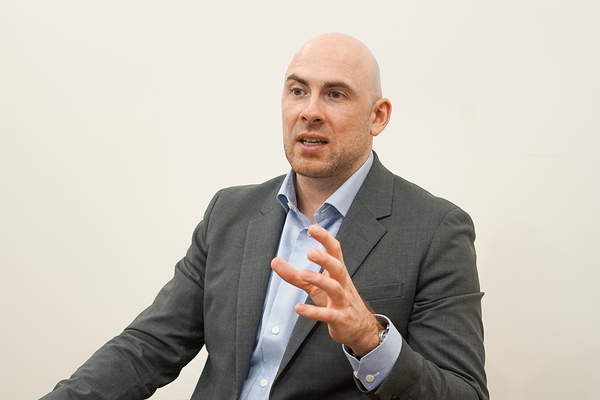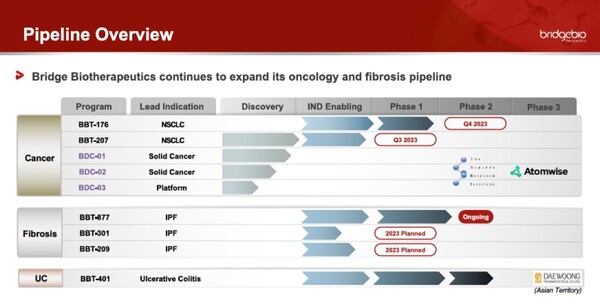Recently designated as an innovative pharmaceutical company by the Ministry of Health and Welfare, Bridge Biotherapeutics has already joined forces with Pinotbio to develop ADC cancer drug candidates, displaying its tenacity to pursue novel drugs.
Bridge Biotherapeutics' Business Development Director Pavel Printsev said, from 2026 onwards, the company will strive to be a “more globally integrated” biotech company.
The company established a separate research center in Boston, Massachusetts, in October 2020, and its research scientists are focused on discovering novel drug candidates, with a specific focus on oncology, he said.

Korea Biomedical Review recently caught up with Printsev to find out a little more about the company’s plans for the rest of the year.
Printsev plays a vital role in ensuring the company’s clinical assets reach patients by partnering with established global pharmaceutical companies that have a large presence alongside exceptional development and commercialization capabilities in their respective territories.
“I work closely with our management and scientific team to reflect market and industry demands with our development strategy so that our products are always meeting and exceeding the high standards expected of first-in-class and best-in-class medicine,” said the business director.
Staying ahead of the competition
Bridge Biotherapeutics is keenly focused on novel drug development in lung cancer and fibrotic diseases.
Currently, one of the most advanced clinical assets, BBT-877, a candidate drug for treating idiopathic pulmonary fibrosis, entered global phase 2 studies in November 2022.
The company also completed phase 2a trials of BBT-401, a drug candidate for ulcerative colitis.
Despite BBT-401 yielding disappointing results in the latest trial, the company reaffirmed its intention to continue developing the novel treatment on Monday.
Additionally, Bridge Biotherapeutics finished the dose escalation phase 1a study of BBT-176, an experimental non-small cell lung cancer (NSCLC) treatment, and plans to submit the U.S. IND application for BBT-207 next month.
“BBT-207’s abstract for a poster presentation at the upcoming AACR has been accepted, and we look forward to sharing our latest pre-clinical update in Orlando, Florida, in April,” Printsev said.
“We are excited about what 2023 has in store for our clinical programs, in addition to the recently in-licensed pre-clinical IPF assets BBT-209 and BBT-301.”

When asked how the company plans to differentiate its oncology drugs from an already saturated market, Printsev replied, “The cancer therapeutics field is broad, and there are many ways to differentiate ourselves from what is already on the market.”
Particularly, BBT-176 is targeting an epidermal growth factor receptor (EGFR) type-protein that contains a specific C797S mutation which is present in up to 20 percent of patients who stopped responding to the best-selling EGFR-targeting NSCLC drug Tagrisso (ingredient: osimertinib), he explained.
The global sales of osimertinib exceeded $5 billion last year, and there is currently no available treatment option for patients with the C797S mutation. Currently, BBT-176 is the most clinically advanced 4th generation EGFR TKI under development globally, he went on to say.
“Aside from our in-house discovery and development, we are also cooperating with other biotech companies such as Cyrus Therapeutics to discover new drug candidates with their targeted protein degradation technology,” noted Printsev.
Once a start-up, Bridge Bio supports other start-ups
Recently back from one of the largest venture biotech incubators for start-ups in Europe called BaseLaunch, the Canadian business developer shared a bit about the company’s involvement in this project.
BaseLaunch, based in Basel, Switzerland, partners with the likes of Roche and Roivant, alongside other leading global pharma companies, and Bridge Biotherapeutics is pleased to be BaseLaunch’s first Asia-Pacific partner, he said.
Every month Bridge Biotherapeutics reviews, assesses, and listens to biotech startup CEOs’ presentations on their prospective venture company, scientific achievements, and business objectives. In turn, the Korean biotech firm provides the startup with feedback that could help grow the company and raise funding.
However, Bridge Biotherapeutics is no ordinary start-up. Just four years in and they caught the attention of German biotech giant, Boehringer Ingelheim, and managed to secure a record-breaking €1.1billion ($1.2 billion) deal for the global licensing agreement for its idiopathic pulmonary fibrosis treatment, BBT-877. Although the billion-dollar deal was cut short in November 2020, through mutual agreement, Printsev said that this helped the company to develop to its present status.
The appeal of Korea’s bioindustry
With over seven years of experience in Korea’s bioindustry transitioning through different roles in Korean companies, Printsev shared his motivation for choosing to work in Korea’s bioindustry.
“I knew I wanted to work at the intersection of business and science, but with the exception of the conglomerates like Samsung and Celltrion, I realized there had not yet been a proportional global impact from Korea’s biotechnology and pharmaceutical sectors despite high-quality research being conducted,” he noted.
From this perspective, he thought he would be able to best use his scientific background in organic chemistry and business passion to achieve his goal of “bridging science and business while filling an important unmet need.”
Before attempting to improve a company’s global business objectives, he fully immersed himself in Korean culture by completing a master’s degree in organic chemistry at Seoul National University while learning the language and culture.
Fast forwarding to the present at Bridge Biotherapeutics, he says he is fortunate to share the same global business aspirations with the company which helps fuel his creative spirit and ambition, unlike the rigid, traditional hierarchical organizational structures at other companies.
“I strive to make Bridge Biotherapeutics a fully integrated global biotech company in the coming decade,” he boasted. He also mentioned that the company will be participating in BIO International conference in the U.S. in June to highlight the company’s business and clinical progress.
Related articles
- Bridge Bio fails to prove ulcerative colitis drug’s efficacy in phase 2a trial
- Bridge Biotherapeutics, Pinotbio join hands to develop cancer therapeutics using ADCs
- Which are newly named as ‘innovative pharmaceutical company’ in 2023?
- Bridge Biotherapeutics, Brainomix team up for P2 idiopathic pulmonary fibrosis study
- Korean biopharmas rush to unveil pipeline developments at AACR 2023
- Bridge Bio wins FDA nod for phase1/2 trial of NSCLC treatment
- Bridge Biotherapeutics discards NSCLC drug candidate BBT-176
- Bridge Bio starts phase 1/2 clinical trial of EGFR-TKI for NSCLC

